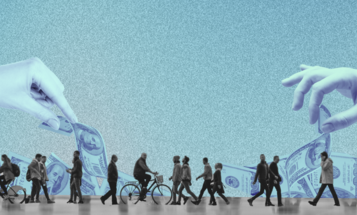
The Story of the Racial Wealth Audit™
I didn’t see her on the streets yesterday, but Federal Reserve Chair Janet Yellen and striking fast food workers are on the same page about one thing: the economy is not working for most American families.
New data from the Federal Reserve’s Survey of Consumer Finances shows that in the past three years, the only folks that saw the economic recovery show up in their paychecks were in the top 20 percent of earners. For the typical (median) household income actually declined.
That data is no surprise to the workers who marched, picketed, and even got arrested to call attention to their poverty-level wages. As I showed in a study of the industry earlier this year, fast food is the lowest paid job in the country, with wages that have stagnated as companies—and notably their top-paid managers—thrived.
The growing gap in America between the very rich and all the rest is a problem for growth, for stability, and not least, for the people who are struggling to get by in an affluent country that depends on an underclass of the working poor. We know from history that economic growth can raise living standards across the board—we know from our current context that it won’t unless we make it a priority to do so.
This summer, Americans have gotten a fresh look at our history of choices to resist some inequities while we let others fester for years. Fast food workers drew from this history to inform their tactics yesterday, expressly making the connection between their case for a raise and the unfinished business of the Civil Rights movement. In his Labor Day speech, President Obama invoked the same connection, paraphrasing Dr. Martin Luther King Jr’s linkage of racial and economic justice in the statement: “For what does it profit a man, Dr. King would ask, to sit at an integrated lunch counter if he can’t afford the meal?”
History shows up in the Federal Reserve data too. Between 2010 and 2013, white families’ incomes declined by 1.5 percent, to $55,800. In families of color the drop was much greater, and the outcome much worse: median incomes in non-white or Hispanic households fell 9.6 percent, to $33,500. Employment and wage gaps fed into even wider disparities in wealth: households of color had about $1 in net worth for every $8 owned by non-Hispanic whites.
Wealth inequality is at historic levels, and that creates other problems as well. Wealth is a critical lifeline for all families when faced with an emergency, like a recession, or an unexpected expense. It is also the way that a household invests in its future. As a result, disadvantages in wealth-building can accumulate to create extreme disparity over time and across markets. Our disinterest in the racial biases of wealth building opportunities over the past 60 years culminated in yesterday’s Federal Reserve numbers, and our continued disinterest will only worsen the trend.
That’s why Demos has partnered with the Institute for Assets and Social Policy at Brandeis University for a new project to make the explicit connections between our policy choices and racial equity. That project, the Racial Wealth Audit™, is a tool that will clarify and measure the way policy reinforces racial disparities by setting the rules of the game for household finances and facilitating or hindering saving. From the minimum wage to federal loans, policy choices today are an opportunity to either intensify or overcome historical barriers to wealth accumulation, and the Racial Wealth Audit™ provides the numbers necessary to make informed, responsible decisions.
Real measures of the racial equity dimensions of our policy choices are a critical first step in understanding how we have broken the connection between economic growth and improving living standards for all but the wealthiest Americans. Fast food workers and Janet Yellen have already started the conversation. The Racial Wealth Audit™ will help translate it into meaningful change.



